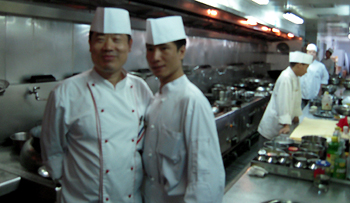Food from A to D

To better entertain guests during the Olympic Games, the Beijing Organizing committee, BOCOG, has handpicked 113 hotels as "Official Reception Hotels" for the Beijing Games. All of these hotels have signed contracts with BOCOG and are set to provide both lodgings and food.
The Four-star China People's Palace Hotel is one of them. Five bus stops away from Beijing's most famous landmark Tian'anmen Square, it has been in operation for 16 years.
Cheng Guohai, a head chef with the restaurant affiliated to China People's Palace talks to Yang Jie of chinadaily.com.cn. about how he prepared to be an Olympic chef.
 |
|
Head chef Cheng Guohai (L) poses with his colleague in the kitchen of the four-star China People's Palace Hotel, handpicked by BOCOG as one of the 113 "Official Reception Hotels" for 2008 Beijing Olympic Games. All of those picked have signed contracts with BOCOG and are set to provide both lodgings and food. [On the Courtesy of China People's Palace Hotel]
|
Chinadaily.com.cn: What special dishes does your restaurant feature?
Cheng: Our restaurant focuses upon Cantonese dishes, with Hangzhou and Hunan cuisine as complementary.
I would recommend two dishes to diners, one is Mizhi Niuzaigu (beef and beef bones braised with honey juice made following secret recipes) and the other is Liaoshen (a special kind of sea cucumber growing in China and Japan).
Containing low fat, beef is a good meat to cook with but, can be difficult to prepare since it is easy to overcook. So when preparing Mizhi Niuzaigu, first we marinate the beef with a special sauce and then braise it in juice. The recipe is exclusively owned by China People's Palace.
Sea cucumber is a good food for bones. Injured athletes often eat sea cucumber to quicken their recovery. We have different ways of cooking sea cucumber. Sometimes we stew it, sometimes we braise it and sometimes we boil it together with abalone soup.
Have you designed some special dishes for the Olympic Games?
Actually we didn't design special dishes for the Olympic Games and the dishes we provide for the Olympic guests are not much different from the dishes we cook on ordinary days.
But we did name some dishes after the Games. For example, we have a dish called Olympic Rings. We work out the five Olympic rings using eggplants, yellow peppers, red peppers, green peppers and purple onion. Then we stuff these rings with varied food materials based upon the requirement of the guests. The stuffings may include shallots, shrimp meat, green beans or baby abalones.
What preparations have you made for the Games?
We have worked out a suitable menu, trained the staff to serve for the Olympic duration and also made sure the restaurant is 100 percent clean. Security is another important aspect. We pay a lot of attention to food safety, eliminate fire hazards and also participate in community security affairs.
Our menu during the Olympics differs from that on ordinary days. We increase the portion of western dishes. Normally our menu is dominated by Chinese dishes, but in the Olympic menu western dishes take up over 70 percent.
Our final menu had to be approved by BOCOG, the organizer of Beijing Games.